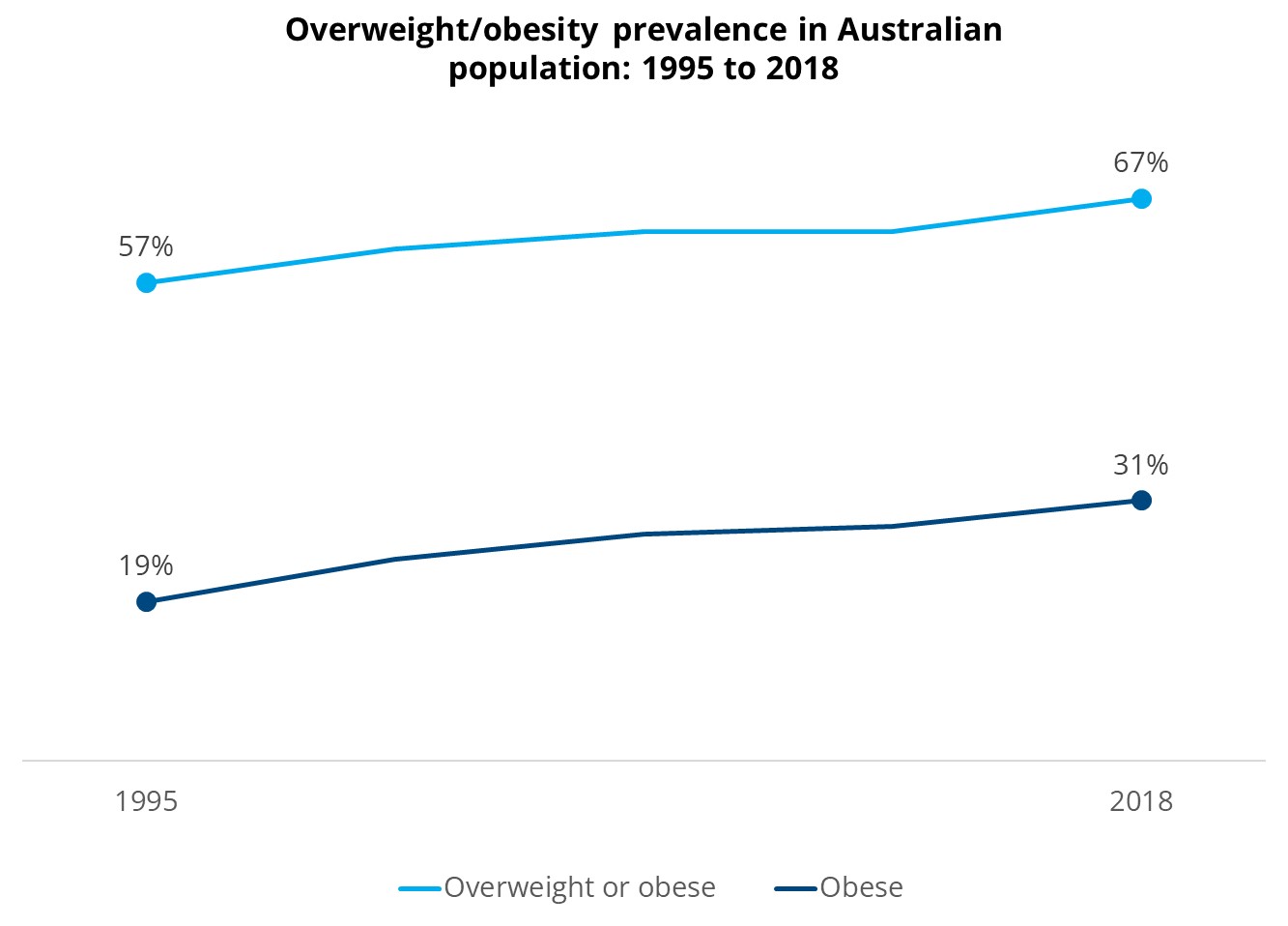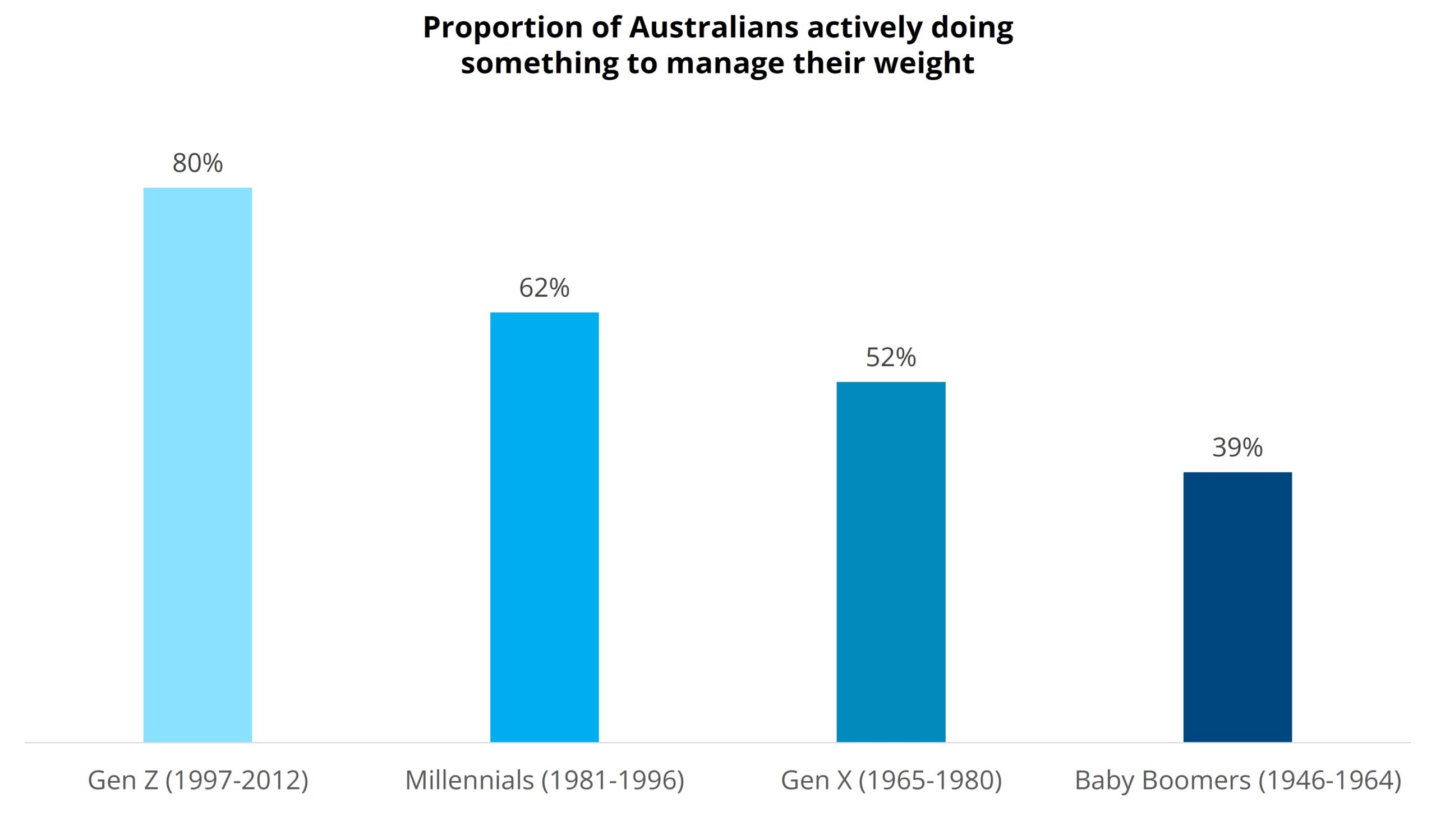Author: Nick Rassool | Posted On: 16 Apr 2024
Overweight and obesity rates have been steadily climbing in Australia, reflecting a broader global trend. According to data from the Australian Institute of Health and Welfare, the proportion of adults who are overweight or obese increased from 57% in 1995 to 67% in 2018 (the last time population BMI data was collected), while nearly a third were classified as obese, up from a fifth in 1995.
As the nation grapples with the physical, emotional, and economic consequences of this public health crisis, weight management has emerged as a pressing concern for individuals and healthcare providers alike.

Despite this concerning trend, data from our consumer tracker shows that most Australians consider themselves to be healthy, with three quarters (73%) rating themselves in quite good, good, or excellent health. However, when it comes to weight, only around a third (35%) are comfortable with their current weight; 1-in-5 (19%) want to lose a significant amount of weight, while 4-in-10 (38%) are looking to shed a few kilos.
younger Aussies and the lure of an ‘easy fix’
The desire for weight loss appears to be more pronounced among younger Australians. A whopping 80% of Gen Z and 62% of Millennials are actively engaged in at least one weight management activity, compared to just 52% of Gen X and 39% of Baby Boomers.

This generational divide could be attributed to higher levels of body consciousness among younger Aussies; young adults often face significant pressures related to body image, and with the continued rise of social media comes increased exposure to idealised body types and a pressure to conform to societal norms.
Accordingly, our data shows that younger Australians are more open to shortcuts when it comes to weight management. Only 27% of Gen Z agree that gradual lifestyle changes are the best path to sustainable weight loss, compared to 43% across other generations. Moreover, a mere 22% of Gen Z Aussies recognise the potential harm of quick-fix diets and extreme measures like weight loss drugs. Comparatively, this rises to 30% among Baby Boomers.
the need for education
The desire for an easy fix when it comes to weight loss has fuelled the popularity of drugs like Ozempic, a GLP-1 agonist initially developed for Diabetes management, that is increasingly being used off-label for weight loss. Unsurprisingly, these drugs often come with drawbacks, including temporary results and potential side effects, including gastrointestinal issues, pancreatic effects and other issues like fatigue, dizziness, and headaches. While weight loss drugs may offer immediate results and temporary relief, long-term success requires a holistic approach that promotes sustainable lifestyle changes and habits.
According to the public health research & practice, between 2013 and 2022, $778 million was spent on obesity prevention initiatives in Australia. This raises the question: why are Aussies turning to weight loss drugs instead of looking at long-term, sustainable solutions? This has important implications for public health departments and private health insurers alike. Evidently, more needs to be done to provide the essential education and coaching required, both in terms of preventing obesity and the risks that come with weight loss drugs. Moreover, could health insurance providers do more to provide customised insurance products catering to the specific needs of different age groups, incentives for healthy behaviour, and risk management strategies?
what next?
Weight management continues to be key focus area for Australians, especially among younger Aussies who are increasingly looking for an easy route to weight loss. However, sustainable lifestyle changes and a holistic approach remain crucial for long-term success.
As we dive deeper into the world of weight management, our next article will explore GLP-1 agonists like Ozempic in greater detail, examining familiarity and perceptions among Aussies.
In the meantime, get in touch to discuss your research needs, and check out some of our other work in the healthcare space, including how we helped a private health insurer enhance its service offering and customer experience.
The Fifth Quadrant team is highly experienced in conducting healthcare and technology market research. To learn more about our capabilities or if you have a brief to share, please get in touch.
Want to stay up to date with our latest content? Sign up below to our newsletter for monthly insights.
Posted in Healthcare, QL, QN

